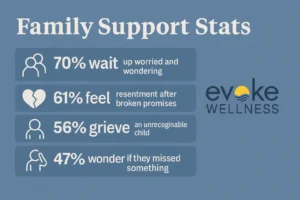You can tell by the way they don’t answer the phone.
The way they dodge questions.
The way the look in their eyes starts to fade again—dull, distant, familiar in all the wrong ways.
It’s happening again.
You hoped the last time was the last time. Maybe they even said it was.
But now your 20-year-old is using again, and your stomach knows it before your head can admit it.
You’ve done what you could.
You’ve called, offered help, pleaded, tried not to enable, Googled late at night, talked to professionals, maybe even taken them to treatment once before.
So why does it still feel like you are the one spinning?
Here’s the truth: you’re not failing them. But you shouldn’t have to do this alone.
That’s why at Evoke Wellness TX in San Marcos, our residential treatment program includes family therapy as a core part of the process. Because your child’s healing is deeply connected to yours. And real recovery includes the people who’ve been quietly holding the pieces.
When One Person Struggles, the Whole Family Feels It
Addiction doesn’t isolate itself. It threads into daily life.
You may not be the one using, but you’ve likely felt the:
- Anxiety of waiting up and wondering
- Resentment that grows after broken promises
- Grief of watching your child become unrecognizable
- Guilt for wondering if you missed something or made it worse
Family therapy doesn’t erase that pain. But it gives it language, space, and—most importantly—support.
When your child enters a residential treatment program, that time away isn’t just about detoxing from substances. It’s about detoxing from dysfunction—emotionally, relationally, and behaviorally. And that means bringing the family into the process, not leaving them behind.
Family Therapy Isn’t About Blame—It’s About Healing the System
One of the biggest fears parents have is this:
“Will the therapist blame me?”
We want to be clear: family therapy is not about assigning fault. It’s about identifying patterns that keep everyone stuck, even when intentions are good.
Here’s what that might look like:
- The parent who wants to help so badly they accidentally enable
- The sibling who’s shut down because they feel invisible
- The unspoken rule that “we don’t talk about hard things”
- The cycle of “rescue → relapse → resentment → repeat”
These aren’t bad people. These are stuck patterns.
Family therapy in Texas helps you see the roles each person has been pushed into—and how to step out of them.
Because you deserve more than survival-mode parenting.
You deserve peace, too.
Why Residential Treatment Programs Prioritize Family Work
In outpatient care, family therapy is often optional. In residential care at Evoke Wellness TX, it’s part of the core model. Why?
Because this isn’t just about temporary sobriety. It’s about long-term, sustainable recovery.
And we know from both clinical research and real-world experience that involving the family increases treatment success.
Here’s how:
- It strengthens communication: Your child learns how to express needs without manipulation. You learn how to respond without panic or shutdown.
- It reinforces accountability: When the family is aligned, it’s easier to support healthy boundaries and harder for addiction to hide.
- It repairs trust: Maybe the word “trust” still feels like a stretch right now. That’s okay. Therapy creates the container where it can begin to grow again.
- It gives everyone a voice: Siblings, stepparents, grandparents—whoever’s been impacted gets a chance to be seen and supported.
Residential treatment removes your child from the chaos. Family therapy makes sure that when they come back, the home environment supports—not sabotages—their growth.
What Family Therapy at Evoke Looks Like
We know the word “therapy” can be intimidating. But at Evoke, we approach family work with care, clarity, and flexibility. It’s not about confrontation—it’s about connection.
During your child’s time in residential treatment, you’ll be invited to participate in:
- Weekly Family Sessions: These may be done virtually or in-person depending on your availability. Sessions are led by licensed clinicians trained in trauma, addiction, and family systems.
- Psychoeducational Workshops: These are focused learning sessions that explain addiction science, relapse risk, co-dependency, and how to rebuild healthy family roles.
- Boundary-Setting Exercises: You’ll be guided through how to set—and maintain—clear boundaries rooted in love, not fear.
- Aftercare Planning Support: As your child prepares to leave residential treatment, you’ll work with the care team to create a re-entry plan that honors your family’s needs and your child’s progress.
And through it all, we’ll hold the emotional complexity of it all: the love, the hurt, the hope, the fear. Because they all get to be there.
Supporting a 20-Year-Old in Treatment Is Its Own Challenge
It’s different than parenting a teen.
They’re legally adults. They have autonomy. They may push back harder.
But here’s what they still need—even if they can’t say it:
- Emotional consistency
- Boundaries that protect connection
- Someone willing to believe change is possible
- A parent who is also healing, not just monitoring
It can feel unfair. You may think, “I’m not the one using—why do I have to do the work too?”
And the truth is: you shouldn’t have to carry their recovery.
But your own healing? That’s yours to claim. And it changes everything.
What If Your Child Doesn’t Want You Involved?
Sometimes your child won’t be ready to engage in family therapy right away. They might be defensive, distant, or shut down. That doesn’t mean the door is closed.
We’ve seen this shift happen again and again:
- Parents begin their own therapy, even while their child resists
- Communication improves gradually, with support from the clinical team
- The child softens as they realize they’re not being judged—but invited
At Evoke, we never force participation. But we do keep the invitation open. Because healing doesn’t follow a linear timeline. Sometimes your willingness to show up first is what eventually brings them back to the table.
FAQs: Family Therapy & Residential Treatment at Evoke TX
Can I attend family therapy if I live far away?
Yes. We offer HIPAA-compliant virtual sessions to ensure all families can participate, regardless of location or travel ability.
What if my relationship with my child is strained or distant?
That’s common. Therapy can begin with low-pressure check-ins or parallel sessions where both sides are supported without direct engagement at first. Repair takes time, and that’s okay.
Will family therapy continue after my child finishes the program?
Yes. We offer transitional support and referrals for ongoing family therapy, either through our outpatient network or local providers in your area.
What if my partner and I disagree on how to support our child?
This is a core topic we address in therapy. Conflicting parenting approaches are normal—and therapy can help you find common ground and a shared plan.
Can siblings or other family members join?
Absolutely. Anyone who plays a significant role in your child’s life can be included, as long as your child and the therapist agree it’s beneficial.
Hope Doesn’t Mean Denial. It Means You Haven’t Given Up.
You don’t have to pretend you’re not scared.
You don’t have to keep smiling through heartbreak.
But you can keep hoping.
Hope is not blind optimism. It’s choosing to believe that this chapter is not the end. That with the right support, healing is still possible—not just for your child, but for your entire family.
Call (888)450-2285 or visit our Residential Treatment Program in San Marcos, Texas to learn how family therapy can help rebuild the safety, strength, and connection your family deserves.



